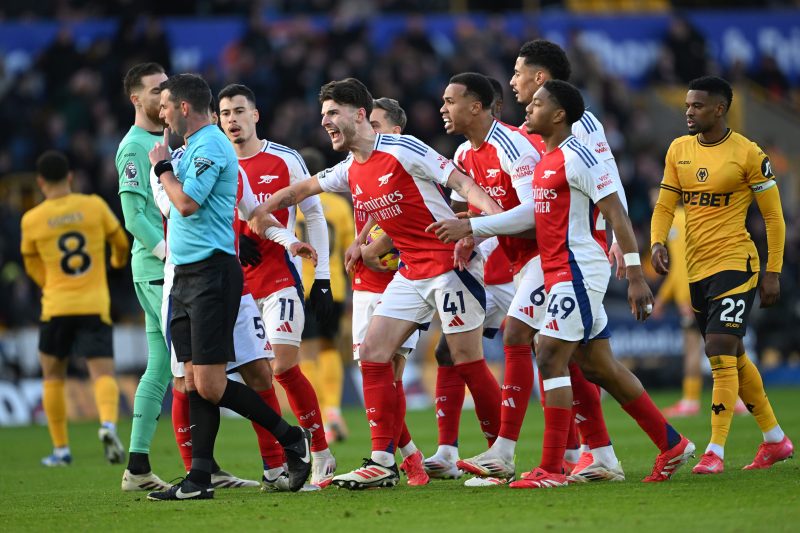
Officials seek VAR improvement as controversies persist in Premier League
A half-decade into its VAR era, the English Premier League is committed to improving the replay system, even as a chorus of fans, players, pundits and coaches alike air their grievances on a seemingly weekly basis.
‘I think personally (VAR) was introduced in a manner that the world expected perfection,’ Premier League chief football officer Tony Scholes told American media on Tuesday. ‘They thought that by the introduction of VAR, there would never again be a referee mistake. That’s simply unrealistic.’
The latest round of discourse came about in late January after Arsenal’s Miles Lewis-Skelly was shown a straight red card for a foul on Wolverhampton’s Matt Doherty, a decision by referee Michael Oliver that many viewed as harsh. Days later, an independent panel rescinded the three-match suspension that initially accompanied the player’s red card.
Such a case is where the nature of soccer and refereeing’s human element collides with the luxury of frame-by-frame replays.
‘I think it’s a reasonable objective to achieve 100% accuracy on factual decisions (like offsides),’ Scholes said. ‘Once you move into subjective decisions though, the very nature of them is exactly the title: subjective.
‘We all have to accept that to a degree, which is why I think that people having visibility of the process, so at least they understand how a decision was made – perhaps a decision they disagree with – that they’re more accepting of a decision.’
Improving VAR is the goal
‘We adopt a high bar for interventions by VAR – a higher bar than they adopt in Europe and that’s deliberately so,’ Scholes said.
Seeking to clarify what warrants an intervention, the Premier League introduced the the concept of ‘referee’s call’ for the 2024-25 season, meaning that the on-field referee’s decision will stand unless the VAR official thinks there’s a ‘clear and obvious error.’
‘It was a foul. It was a bad foul,’ Scholes said of the Lewis-Skelly sending-off. ‘The question becomes was it a bad enough foul to be a red card?’
The Premier League’s chief football officer since 2022, Scholes said the league ‘wasn’t in the best place’ with VAR after a controversial call in last season’s Tottenham-Liverpool game – a goal incorrectly ruled offside that didn’t get an intervention after a breakdown in communications between the officials.
‘We got into a difficult place – to be honest – on VAR because of a high-profile error,’ Scholes said.
According to the Key Match Incident Panel, which analyzes calls in every match, 66 of the league’s 70 VAR interventions this season have been correct, with nine other occasions cited that VAR should have intervened but did not.
But they might never please everybody.
‘Of the four errors, I actually think one of them wasn’t an error at all. I think it was the correct decision,’ Scholes said. ‘That’s my personal view.’
Semi-automated offside is coming
While the Premier League hopes to implement a semi-automated offside system, errors in other leagues using similar technology have slowed its implementation in England.
‘Until such point that we are confident there will be a 0% error rate, we won’t be introducing it,’ Scholes said.
The league intended to bring the system online earlier, but ‘testing has proved more challenging than we thought it would be,’ Scholes said, adding that while he hopes semi-automated offside will be used ‘at some point this season,’ he expects it fully be in place by the team the 2025-26 season begins in August.
The technology made a high-profile mistake in Spain earlier this season, with a ‘glitch’ in the system incorrectly ruling that Barcelona’s Robert Lewandowski was offside for a goal against Real Sociedad.
‘It is because of situations like that that we have delayed,’ Scholes said.
Semi-automated offside was used for the first time in a major tournament at the 2022 World Cup and has since been adopted by leagues around the world.
